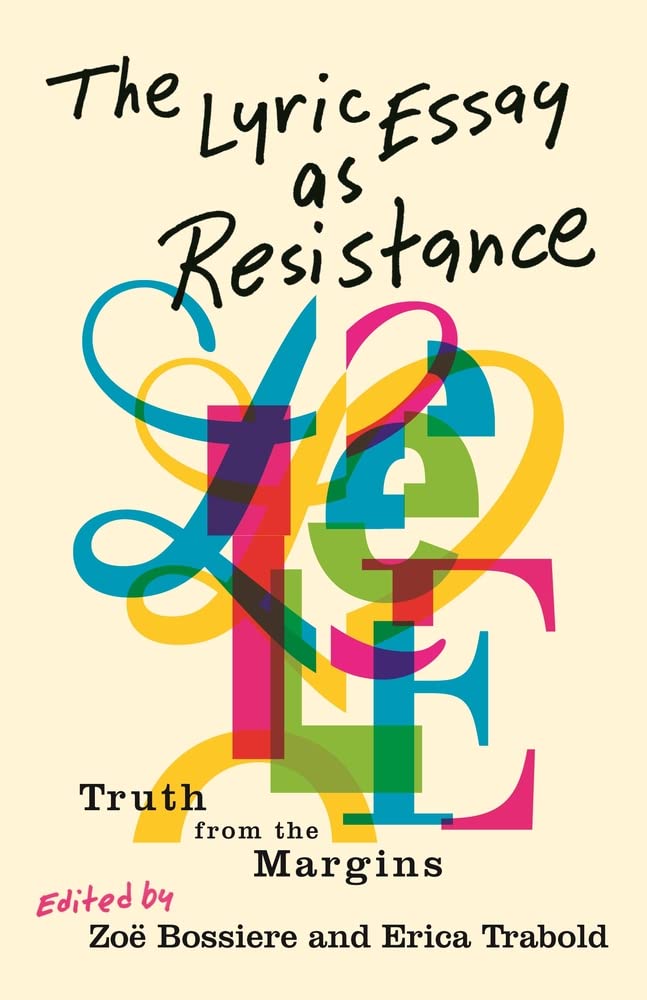Truth from the Margins
Edited by Zoë Bossiere and Erica Trabold
Wayne State University Press ($24.99)
The personal essay continues to assume new ranges of shapes and impulses. “Essay” turns as both verb and noun—a point of departure that ultimately takes as its subject that most fictional of all creations, an “I.” Over recent decades, the hybrid that John D’Agata originally tabbed as “lyric essay” has offered writers new means of inhabiting that “I.” As D’Agata put it in We Might As Well Call It the Lyric Essay (Seneca Review Books, 2015), this genre’s “beautiful, gangly breadth” recenters or disrupts our place in the world. This dislocation is the starting point of The Lyric Essay as Resistance: Truth from the Margins, a recent anthology edited by Zoë Bossiere and Erica Trabold.
Rhetorically at play, the lyric essay offers a space between “telling” and “being told.” As Bossiere views it, “To write from the margins is to write from the perspective of the whole—to see the world from both the margins and the center.” Somewhere between these spaces, an “I” emerges, as Trabold finds it, in “the road blocks and potholes and detours—those gaps, the words left unspoken on the page . . . as important as the essay’s destination.” These powerful essays recognize the fragmented subjectivities that develop within the fits and starts of language itself, stories caught in media res, and words truncated in speech and memory. On these pages, voices develop within a range of subjects—personal maelstrom and adopted celibacy, bodies redefined in the sharp barbs of racism or the ambiguities of gendered experience. “I’s” stranded in time and memory, written into life via lyric essays, accrue towards “voice.”
The writers follow phantoms and rumors, hints of selves that have inhabited or passed through the world. They negotiate pages written across time. Molly McCully Brown addresses a series of fragments to “Dear Frances, Dear Franny, Dear F, Dear Sister, Dear Ghost.” In “Whens,” Chloe Garcia Roberts narrates her “own birth story . . . one that is not [her] mother’s to tell.” Jennifer Cheng writes, “I map the ghosts; the ghosts map me. . . . the strange ambiguous homesickness I have known in the hollow cavity of my stomach every now and then since childhood.” Lyric offers a means of approaching what can be described or named amidst that “ambiguity.” Within this split, Melissa Febos recognizes, “I have not only strayed from the self I was before, but been changed. . . . My past self is a stranger, an imposter who inhabited my life for two years.” The challenge is to give that self a “voice.”
In a core essay, Danielle Geller engages Navajo words through a series of footnotes and recollections, attempting to find a way of speaking and writing a subjectivity shaped by language’s loss. Responding to a Navajo word for “Is it true?”, Geller writes, “The answer is, in many ways, unknowable. For our mothers, the surest protection from the past was to spin truths and falsehoods into one story, one thread, impossible to distinguish in the weave.” An “I” emerges from narrative’s warp and woof here, the threads left dangling or tugged into speaking. In this piece’s exploration, sometimes the lyric is more attendant to silence than any “I” speaking in place. The lyric essay offers a space to explore these entangled truths. Shook loose, this collection’s voices haunt, know, and speak in their persistence.
Click below to purchase this book through Bookshop and support your local independent bookstore:
Rain Taxi Online Edition Fall 2023 | © Rain Taxi, Inc. 2023

